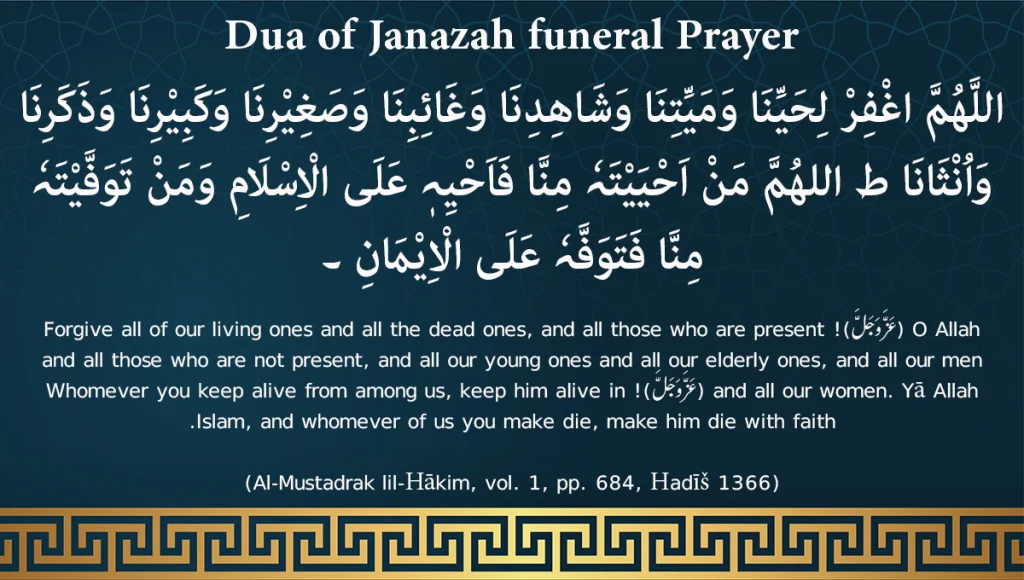Dua For Funeral - Namaaz E Janaza
For Funeral Prayer – Namaz E Jinaza
There are several supplications that Muslims can recite during a funeral to seek Allah’s mercy and forgiveness for the deceased. One such dua is:
“اللَّهُمَّ اغْفِرْ لَهُ وَارْحَمْهُ، وَعَافِهِ وَاعْفُ عَنْهُ، وَأَكْرِمْ نُزُلَهُ، وَوَسِّعْ مُدْخَلَهُ، وَاغْسِلْهُ بِالْمَاءِ وَالثَّلْجِ وَالْبَرَدِ، وَنَقِّهِ مِنَ الْخَطَايَا كَمَا نَقَّيْتَ الثَّوْبَ الْأَبْيَضَ مِنَ الدَّنَسِ، وَأَبْدِلْهُ دَارًا خَيْرًا مِنْ دَارِهِ، وَأَهْلًا خَيْرًا مِنْ أَهْلِهِ، وَزَوْجًا خَيْرًا مِنْ زَوْجِهِ، وَأَدْخِلْهُ الْجَنَّةَ، وَأَعِذْهُ مِنْ عَذَابِ الْقَبْرِ وَعَذَابِ النَّارِ”
Translation: “O Allah, forgive him and have mercy on him, heal him and pardon him, honor his position, widen his entry, wash him with the purest water, snow, and hail, purify him of sins like a white garment is cleansed of filth, replace his home with a better home, his family with a better family, his spouse with a better spouse, admit him to Jannah, and protect him from the torment of the grave and the fire.”
Reciting this dua for the deceased during their funeral is considered a virtuous act in Islam and is a way to seek forgiveness and mercy for the departed soul.
How to Pray the Janazah (funeral) Prayer
The Janazah prayer, also known as the funeral prayer, is a specific prayer performed by Muslims for the deceased. Here are the steps to pray the Janazah:
- Make the intention: The intention is to pray the Janazah prayer for the deceased. The intention can be made in the heart and does not need to be spoken out loud.
- Stand up: Stand facing the qiblah, which is the direction of the Ka’bah in Mecca.
- Recite the first takbir: Raise your hands up to the ears and say “Allahu Akbar” (God is the greatest).
- Recite the second takbir: Place your right hand over your left hand on your chest and recite the following: “Ash-hadu an la ilaha illallah.” (I bear witness that there is no deity but Allah.)
- Recite the third takbir: Keep your hands in the same position and recite the following: “Ash-hadu anna Muhammadan rasulullah.” (I bear witness that Muhammad is the Messenger of Allah.)
- Recite the fourth takbir: Lower your hands and say “Allahu Akbar” and then make dua for the deceased. You may use any dua that is appropriate for the occasion.
- End the prayer: End the prayer by turning your face to the right and saying “Assalamu alaikum wa rahmatullah” (peace and mercy of Allah be upon you) and then turning your face to the left and repeating the same.
It is important to note that the Janazah prayer is performed in a group and is led by an imam or a knowledgeable person. The prayer can be performed at any suitable place, such as a mosque, a cemetery, or any open space.

Some things to note about the Funeral Prayer (Namaaz E Janaza):
- There is no Ruku or Prostration in the Funeral Prayer.
- Funeral Prayer can also be performed in absentia for a deceased person, especially for prominent people or in a case when few Muslims have offered the original Funeral Prayer.
- To offer a Funeral Prayer for a Muslim is obligatory for the body of all Muslims. It is called Fardh-i-Kifaya. Thus if only a few people offer the Funeral Prayer they are deemed to have done it on behalf of all Muslims. The rest of the Muslim Community is therefore absolved from the obligation of performing the Funeral Prayer.
- A single Funeral Prayer can be performed for a number of dead persons at the same time.
- If a dead body is to be transported a considerable distance prior to burial, then the Funeral Prayer must be performed before such transportation commences.
- More than one Funeral Prayers may be performed for the same person, usually at two different locations.
- Women may join in the Funeral Prayer. However, when such Prayer is performed at the graveyard, it is generally recommended that women not accompany the burial party due to their softer hearts.
- Funeral Prayer is not offered for a person who took his or her own life.
